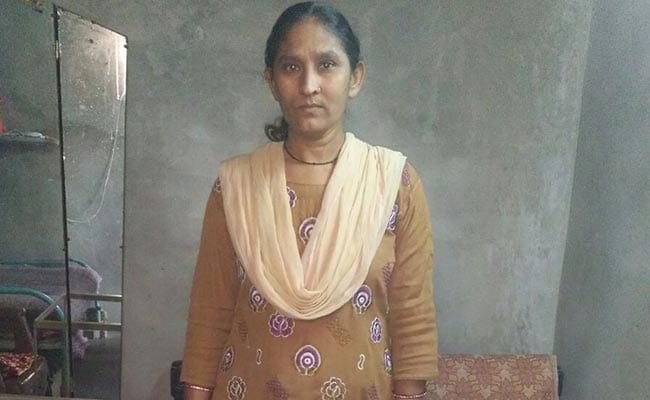- Home/
- Removing 'Dis' From Her Ability, Raziaben From Ahmedabad Stood Up For Her Family's Basic Requirements And Started Earning
Removing 'Dis' From Her Ability, Raziaben From Ahmedabad Stood Up For Her Family's Basic Requirements And Started Earning

"I can't change the direction of the wind, but I can adjust my sails to always reach my destination", Jimmy Dean, an American singer had said this and it is apt for Raziaben Mehboobbhai Pinjara from the Dholka district of Ahmedabad.
39-year-old Raziaben, a physically challenged woman, a homemaker, and a mother of three (a boy and two daughters) found it difficult to run her household. Raziaben's husband Mehboobbhai Pinjara works as a driver, but his earnings were not enough to sustain a family of five. The financial crisis were so severe that despite the physical disability, Raziaben and her family had to rent a room on a second floor, reason being, less room rent.
Also Read: Silai School Women From Jaipur And Ahmedabad Prepare For The Lakme Fashion Fashion Week
Determined to change the life of Pinjara family and fulfill family's day to day basic needs, Raziaben decided to acquire sewing skills and start working. For the same, she enrolled herself in USHA Silai School in October 2015. As part of USHA Silai School month long programme, Raziaben learned sewing and embroidery and ended up opening her own silai school in the same year.
Today, with her own silai school, Raziaben manages to earn Rs. 6,000 every month. The deteriorating condition of her family has been stemmed. Now, Raziaben's life not only revolves around managing household chores, but also her own silai school. Till date, she has trained 10 women and is currently taking a class of four in her school.
After her regular household duties are over, she does zari work. In the afternoon, she takes classes and works on the orders. Raziaben's daughters too do zari and sewing work. Along with this, they support their mother by taking orders from across the village.
Raziaben's dream turned into a reality when she got an opportunity to work along with 31 USHA Silai School women to produce a clothing line that was launched at Lakme Fashion Week 2018. Having achieved this, she looks forward to train more and more people and open her own tailoring shop.
Also Read: A Dream Turns Into A Reality: The Silai Label Launch At The Lakme Fashion Week
Related Stories
More- Team NDTV | Monday February 16, 2026
Odisha's Suchismita Sahu, Rajasthan's Preeti Prajapat, Manipur's Akhirun—Usha Silai School's Kushalta Ke Kadam celebrates these awardees, from homemakers to master trainers earning accolades
- Team NDTV | Thursday February 12, 2026
From Ladakh peaks to Assam fringes, Usha Silai School trains tribal women in Turtuk, Kargil & Dakhinkuchi—crafting livelihoods with armed forces, NHPC & NGOs. Stitching national resilience
- Team NDTV | Thursday January 29, 2026
From West Bengal's transgender tailors to Telangana's tribal seamstresses and Meghalaya's embroidery revivalists, Usha Silai School's Kushalta Ke Kadam partners with NIRDPR and state governments
- Team NDTV | Tuesday February 03, 2026
In Odisha's mining heartlands, Mahanadi Coalfields Limited teams with Usha Silai School's Kushalta Ke Kadam and Gram Utthan, empowering tribal women turning them into entrepreneurs
Adopt a Silai School
About the Initiative

Kushalta Ke Kadam, an initiative by USHA Silai School and NDTV has entered its eighth season. The aim is to empower more women across rural India by teaching them sewing skills and helping them open new doors of opportunities for themselves. The initiative encourages rural women to become financially independent and entrepreneurs by taking up sewing and training others in their respective communities.
Since 2011, the USHA Silai School initiative has trained more than 12 lakh rural women through over 33,000 Silai schools, spanning over 20,751 villages across India.
The women earn Rs. 4,000 – 5,000 per month on an average, with the highest recorded monthly earning being Rs. 84,000 in a month. This earning works as a catalyst towards building their self-confidence, reducing gender inequities, and raising their stature within their families and in society at large.
In Pics

Rebari girls grow up learning traditional embroidery, which along with their new found sewing skills developed at Usha Silai Schools, is helping them earn a living.

Usha Silai School has empowered many rural women to support their family and send their children to school.

The Usha Silai School, established in a small nondescript village that goes by the name of Kottai, is helping empower people from varied communities.

The all-inclusive Usha Silai School Programme covers the entire nation from hamlets tucked between hills to villages cast by the sea.

Vegetables farmers from the Mizoram hills earn very little given the topography of the area. Usha Silai Schools have played an important part in this region by skilling women to financially contribute towards their households.

Usha Silai School learner Lucy has trained seven other women in her community, helping them to become financially independent.

Women like Kaviben from the nomadic Rebari community are finally laying down their roots as they begin to gain financial independence and thereby stability through Usha Silai School.

Usha Silai School, located in the Gujarat's Bhuj village, is enabling rural women to earn as much as Rs. 2,500-4,000 each month.

Usha Silai School, in association with a Gujarat based NGO called Kala Raksha, is trying to bring about a Silai revolution in Bhuj.

Besides training other women from their community, many Usha Silai School learners have become entrepreneurs in their own right.

With sewing becoming easily accessible and lucrative, the silai schools are also helping revive traditional motifs and designs.






